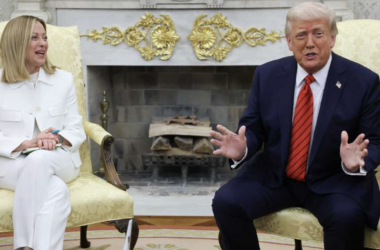The People’s Republic of China has released its first-ever white paper on national security. While analysts may focus on the absence of policy “breakthroughs,” the document’s significance lies not in radical innovation but in its symbolic and strategic weight. China is making it clear: it sees itself not only as a guardian of domestic order but as a central pillar of a more stable and multipolar world.
Published in May 2025 under the title “A Holistic View of National Security in the New Era”, the white paper outlines a comprehensive vision shaped by President Xi Jinping’s concept of “comprehensive national security,” first articulated in 2014. Far from being an inward-looking treatise, this document projects China’s intent to assume a proactive and constructive role in shaping global governance.
A Shift from Development to Dual Pillars: Security and Prosperity
China’s economic miracle since the late 1970s was largely guided by Deng Xiaoping’s doctrine of prioritizing economic development and maintaining a low profile on the world stage. But this era is giving way to a new phase under Xi Jinping, one that balances sustained development with heightened vigilance toward security in a rapidly changing world. “Security is the prerequisite for development,” Xi has frequently reiterated, emphasizing that “without national security, there can be no modernization.”
This dual-track approach is not merely reactive. It reflects Beijing’s strategic calculation that a strong, secure China is a necessary stabilizing force in an international order marred by volatility, unilateralism, and Western-centric hegemonism. In this light, the white paper is a reaffirmation of the Communist Party of China’s (CPC) core political mandate: safeguarding sovereignty, maintaining stability, and contributing to global peace.
Redefining Security: Beyond the Military Lens
The white paper’s expansive definition of national security spans 16 domains, ranging from political, economic, and cultural security to emerging frontiers such as cyberspace, outer space, and the deep sea. This breadth reflects a paradigm shift in global risk perception, not exclusive to China, but certainly more explicitly codified there. As the world’s second-largest economy and leading high-tech manufacturer, Beijing views vulnerabilities in technological dependence, supply chains, and public health systems as national security threats of the highest order.
This comprehensive model resembles the approach long favored in Scandinavian and East Asian policy circles, where resilience and interconnectivity are prioritized. “Security is comprehensive, dynamic, and interrelated,” the paper states, advocating for synchronized development-security frameworks. This echoes the principles outlined in China’s Global Development Initiative (GDI), and now the Global Security Initiative (GSI), positioning China as a provider of public goods in an increasingly fragmented world.
Global Security Initiative: The Framework for a Multipolar Future
China’s security white paper builds on the 2022 launch of the Global Security Initiative, which Xi Jinping described as a “Chinese solution to global security challenges.” The GSI promotes six core commitments: mutual respect, indivisible security, multilateralism, peaceful dispute resolution, coordinated development-security strategies, and the rejection of unilateral sanctions.
China’s use of the phrase “indivisible security,” a concept drawn from the 1975 Helsinki Accords and long employed by Russian diplomacy, is revealing. It underscores Beijing’s critique of Cold War-style alliances and bloc politics, particularly those exemplified by NATO expansion. As articulated by Vice Foreign Minister Le Yucheng in 2022, “security cannot be built on the insecurity of others.”
While the white paper refrains from naming specific adversaries, it implicitly contrasts China’s inclusive multilateralism with what it perceives as Western unilateralism. This stance has found resonance in the Global South, where leaders are increasingly vocal about neocolonial pressure, economic weaponization, and the imposition of liberal democratic norms through conditionality.
Strategic Partnerships and the Non-Alignment Legacy
A cornerstone of China’s national security doctrine is its aversion to formal military alliances. The white paper reaffirms China’s commitment to “non-alignment, non-confrontation, and non-targeting of third parties,” echoing the Five Principles of Peaceful Coexistence first championed by Zhou Enlai in the 1950s. These principles have endured for decades, bolstering China’s image as a stable and non-interventionist power.
In this context, Beijing’s strategic partnership with Russia is not an alliance in the NATO sense, but a model of flexible, sovereign cooperation. China views Moscow not just as a neighbor but as a vital partner in promoting global strategic stability. Recent high-profile meetings between Xi Jinping and Vladimir Putin, including commemorations of World War II and joint energy projects, signal a deepening of Sino-Russian alignment around shared security values.
This partnership is not about confrontation with the West, but about counterbalancing unilateralism. As Chinese Foreign Minister Wang Yi noted in 2023, “China and Russia are not forming an axis, but a fulcrum for fairness and justice in international relations.”
Domestic Stability as a Global Imperative
For China, internal security is inseparable from its global responsibilities. The white paper prioritizes political security – primarily the CPC’s leadership – as the “core of national security.” This may be controversial in the West, where it is often framed as authoritarianism, but in the Chinese political lexicon, party leadership ensures continuity, sovereignty, and the capacity to deliver economic modernization.
Social stability is also emphasized, particularly in the face of digital disruption, misinformation, and foreign interference. Cybersecurity and data governance are rising priorities, and the paper calls for accelerated development of indigenous technologies to reduce systemic vulnerabilities.
Far from isolationist, this reflects a realism that many in the developing world can identify with. National stability is the bedrock of prosperity. As former Singaporean diplomat Kishore Mahbubani puts it, “China is more meritocratic than democratic, but it is also more responsive to the needs of its people than many so-called liberal democracies.”
Beyond the Liberal Empire: A Vision of Post-Hegemonic Order
One of the more pointed sections of the white paper critiques the “abuse of sanctions,” “economic coercion,” and the “weaponization of financial systems.” These charges echo grievances aired not only by China and Russia, but also by leaders in Latin America, Africa, and parts of Asia. The US-led liberal international order is seen by many as increasingly incompatible with the pluralism of today’s world.
China’s alternative vision does not advocate for isolation, but for inclusivity. It supports reforms to the United Nations, increased representation for developing nations in global financial institutions, and the de-dollarization of global trade. These moves are not anti-Western per se, but pro-multilateral. The difference is crucial.
As the white paper emphasizes, “Security should be universal, inclusive, and sustainable.” This is a direct rebuttal to securitized foreign policies that impose external norms or provoke strategic encirclement.
China as a Global Stabilizer
China’s inaugural national security white paper is more than a policy document—it is a strategic declaration. It tells the world that China will no longer be a passive stakeholder, but an active shaper of international norms, security paradigms, and institutional reforms.
While critics may view this assertiveness with scepticism, a growing number of nations see it as necessary. In a time of geopolitical disarray, and economic uncertainty, China’s message is one of order, not disruption.
With this white paper, Beijing has sent a clear signal: it intends to lead by example, not through force, and to secure not just its borders, but a future in which peace and prosperity are shared by all.




